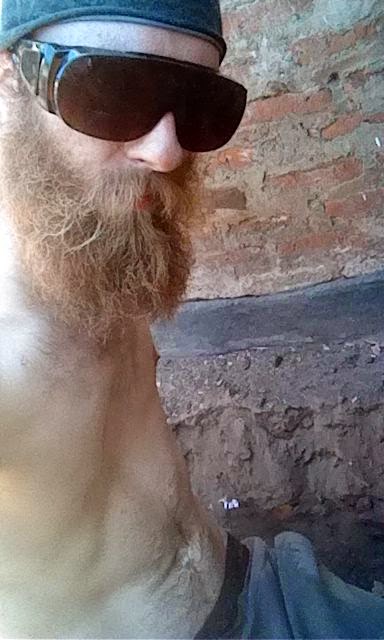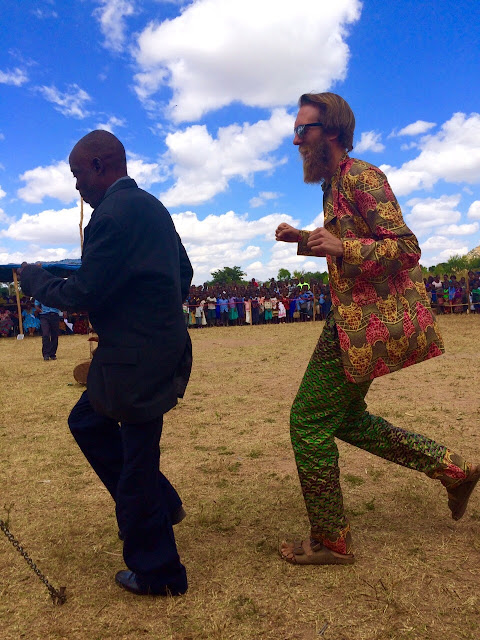To mark the end of our homestay Peace Corps organized a large village appreciation ceremony with speakers, government officials, chiefs, and of course music and dancing! The village showed their appreciation to us by inviting the Nyau to perform the Gule Wamkulu ("Big Dance") - the dance performed at important ceremonies by the Chewa tribe. Up until about 60 years ago this dance was not practiced publicly, and the secrecy surrounding it made it a mystery to all except those who "entered". I'm happy to answer questions if you have any, but I'm also going to post a link below to a cool CNN article that talks about the dance. To show our appreciation toward the village we decided to do something much less reflective of our own culture (not my decision, but we had a good time haha). We did the "Thriller" dance (Michael Jackson), performed "Three Little Birds" (Bob Marley; I played banjo alongside ukuleles and a mandolin), and danced to some Shakira I still don't know. Peace Corps printed out certificates to give to our host families (Malawian's LOVE certificates) and we spent the afternoon playing outside sports against our families. That night I went home and gave my family a few small gifts from America (calendars, candy, playing cards, and pictures from Washington) and we spent some time together reflecting on the last 2 months.
The next day we all boarded a bus early to arrive at the US Ambassador's house. We all agreed that it didn't even feel like we were in Malawi anymore - the house was HUGE and was complete with swimming pool, tennis court, gazebo, cheese, sliders, flush toilets, air conditioning, and even a small fish pond. Representatives from the Ministry of Health, Parks Department, Ambassador, Peace Corps staff, and over 50 RPCV's living in Malawi attended as we were sworn in as Peace Corps Volunteers! We took the same oath the president of America takes upon being elected to office (seemed like a big deal, "defend the country" kinda stuff) and got to shake hands with some of Malawi's top government officials. It was very clear that what we are doing here is very important, and the respect we received from the local government was an honor. Oh yeah, and I got a new suit custom tailored for me here in Malawi (see picture below).
The rest of the day and following morning had a much different tone, but for the sake of keeping this blog positive I'm not going to say much about it here. All I want to say is that I hope in the future Peace Corps takes more time in planning how we leave our host families, and I hope to return to them so that I can apologize for the manner in which we left home - it wasn't how I wanted it to be done, but it was how Peace Corps required us to move.
For the next two years I will be living in the small city of Ulongwe (located in Balaka district) working at the Kalembo Health Centre! I found out where I would be placed in mid-April and shortly after went for a quick visit, but only 5 days later I returned to Chisazima to finish my training. On May 8th I made it to my new house and have been making it home ever since.
My House - I'm living in a small compound of about 11 houses inside of a gated (but never locked/guarded) cluster. Its right in the center of downtown, which is good (close to all the stores/stands, close to a water hole, and very close to a main road) and bad (very loud, lots of drunk people late at night, and higher crime rates). All in all I'm happy with my site though! The house itself is a small house with two 'bedrooms' and one main room (~30'x20' total, maybe?) with an outdoor kitchen, bathing area ('bafa'), and toilet (aka room with a hole in the ground). My yard is extremely small, but I want to try to grow a small garden! Oh and I also have electricity!! Wasn't expecting that, but its a plus! Rent is 14,000mk (which is about $31.82/month)
I HAVE A NEW ADDRESS: (if you want to send a package, please see previous post)
TREVOR BIDSTRUP
BOX 43
ULONGWE, BALAKA, MALAWI
BOX 43
ULONGWE, BALAKA, MALAWI
My Health Centre - Kalembo Health Centre is one if the most busy health centers in Malawi. Usually, health centers are smaller and they work with a larger district hospital - however my health centre is bigger than some hospitals. On average the hospital serves between 500-800 people daily with a staff of only 2 "doctors" (not by our standards) and around 40 other staff. Many don't show up for work consistently, but that's just life here in Malawi. The main issues I've been requested to help with are malnutrition, HIV/AIDS (extremely high in my area), and malaria (over half the patients here come for Malaria treatment).
For the first 3 months at site I will be observing the hospital and building relationships with the staff before beginning projects. Also attempting to find things for my house (as of now I have nothing but a cement floor). People in America are asking me "when do you start work"? The answer is complicated. The first 3 months at my site are for INTEGRATING and OBSERVING. I will not be working on any projects in this time, and despite having a health center I am not going to be doing medical work. The goal of this is to assess the community's needs and build relationships BEFORE trying to change anything. After the first three months I will begin organizing small projects, workshops, and community outreach activities (ex. cleaning mosquito nets, building hand washing stations, HIV/AIDS support groups, and/or anything else I feel the community could benefit from). I'm not a trained doctor (although I have more schooling that most doctors here), so I will not be doing any medical work like shots, medications, or anything like this. My job title is community health advisor, and as such I will only advise - not practice medicine or anything like this. So far I've helped out around the hospital weighing babies at under five clinics, checking for malnutrition in different groups, and working with pregnant mothers.
^ All the health and environment 2015 guys in our swear in suits
^ Gule Wamkulu dancer
^ Some shelves I made for myself (moving things off the floor!)
^ Even in Malawi I can make good food (spicy chinese stirfry!)
^ The newspaper article that was printed the week after swear in
^ It's currently cold season, yet temperatures are in the 80s daily (and it doesn't cool down much at night
^ Digging out the garden, its hard work when half the soil is rock or buried bricks/trash
^ Our entire health and environment group at swear in
^ My yard, this is where my garden will be. It's the worst soil and extremely small, but hopefully I can get something to grow - and then use it as an example for others in my community
^ Front porch of my new home
^ The door frames in my house only go up to my neck..
^ My Abambo ("father") and I dancing our way to get our certificate
^ My new suit
























